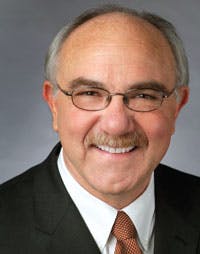Dr. Jack Phillips, the chairman of the ROI Institute, explains why your company isn't making the money it should at dental trade shows
By Kevin Henry, Editor
Editor's Note: I recently had the pleasure of interview Dr. Jack Phillips. As a world-renowned expert on accountability, measurement, and evaluation, Dr. Phillips provides consulting services for Fortune 500 companies and major global organizations. The author or editor of more than 50 books, Phillips conducts workshops and makes conference presentations throughout the world.
Kevin Henry: Do you believe company executives know or care about their company's ROI when it comes to trade shows?
Dr. Jack Phillips: There is often a fear of results, so people don't want to see the ROI from a trade show, but you have to know what it is and what you've accomplished. Ultimately, the funder of the company's marketing budget is going to want to see the ROI from the trade show, even if the people who run the exhibit don't. It's better to know ahead of time than face the consequences of not knowing.
Henry: Trade shows seem to be under the microscope today more than ever. What are your thoughts on the trade show industry?
Dr. Phillips: There are some problems in the trade show industry. Trade show space has increased overall by 37% since 2000, yet attendance is down overall at trade shows by 2% to 3%. Cities keep building exhibit space and convention halls, but the trend isn't there to support that building right now. We see, across the board, attendance going down and exhibits getting fewer and smaller. Some companies have stopped exhibiting altogether. Yes, trade shows are under more scrutiny today than ever, yet there are still companies who are successful at trade shows. I believe that exhibits can work, and I believe it's not that difficult to make them work. It begins with the approach, "If we're not delivering value and sales, we need to change things."
Henry: How should companies be measuring their trade show ROI?
Dr. Phillips: There are really two different ROIs when it comes to trade shows – looking at it from a participant's perspective, as well as the usual ROI math we can find from exhibiting at a show. It's easier to show the exhibition ROI, but it's important to see things from the participant's view. Through post-show surveys, participants tell companies what they're doing with what they learned at the exhibit. From there, the company can truly see the monetary impact of exhibiting.
Exhibitors often track sales, but it's critical that the company follows up to see if new sales come as a result of the exhibit, not just at the exhibit. The salespeople have to collect data at the booth, but that's not the end of the job.
Customers are often labeled as "hot leads" if they can easily be converted into a sale. The ROI from a show can be calculated on that, but again, it takes follow-up by the company to make this happen. Companies have to step up and make that extra effort a part of the salesperson's job. Too often there is a feeling regarding trade shows by those in the booth that "my job isn't going away," so they don't feel threatened. Companies have to build in that expectation for shows and really make them stick. I heard a hospital's general manager tell a group before a meeting, "If we don't show the value of the programs we're presenting, there will be fewer of you in the room next year." That certainly built a sense of urgency. Am I saying threats are the only way to get the job done? No, but there has to be some accountability, and there have to be measurable ways to show that the time at the exhibit paid off for the company.
It all starts with setting objectives. I like to think of these objectives as different levels.
Reaction objectives — What reaction do you want from people who visit your booth? Do you want them to be impressed with the information you provide? Do you want them to focus on the design of the booth, or would you rather have them focus on the content of the booth? What are the main things you want people to react to when they walk up to your booth? Remember, the flashier your booth is, the more your message can become confused.
Learning objectives — What do you want customers to know about your company and/or product lines? When you know this, the group at the booth can be focused on that message and if that message is truly occurring when someone walks up to the booth. You have that message in your mind, and the conversation and feedback is very focused.
Part of this is also sorting out who is a "looker," and who is a visitor truly interested in your product. Much of this can be figured out before the show begins by analyzing the audience before they ever show up. You should know who the decision-makers are that you want to attract to your booth, and then work ahead of time to get them to your booth. After the show, you can determine your exhibit efficiency by figuring what percentage of those decision-makers showed up.
Action objectives — What's often left out of the equation is what level of action will be taken after the show. There is often a step between being at an exhibit and actually purchasing the product. Do you want your visitors to check your website after they leave? Do you want them to receive a free sample? What are the next steps your company will take after potential customers leave the exhibit hall? That has to be a very clear message for customers and a clear objective for your company.
Why did that customer make that purchase and how does he or she feel about the purchase? Those are two very important questions for every company to know.
Let me give you an example. I recently attended a trade show in Nashville. At the same time this trade show was occurring, an auto show was going on in the same building. I walked over to the auto show and stopped at the Land Rover exhibit. The salesperson walked up to me and asked me some very focused questions about me and my line of work. When he learned I had a small business, he told me about the tax breaks available to small businesses when purchasing a car such as the Land Rover. My wife and I were intrigued by these incentives, so we called our accountant to ask about these tax breaks and, sure enough, it was a very good deal. We had driven to Nashville from our home in Birmingham, and we stopped at a Land Rover dealer on the way home and actually bought a car.
Land Rover never followed up with me to ask me why I bought that car. Why wouldn't a company ask me what influenced me to make that decision? I wouldn't have thought about buying the car if it hadn't been for the tax break information I learned at the trade show. Companies need to follow up after a show to see what customers bought and why. Knowing information like this takes the guessing out of the true effect of your exhibit. Sadly, you don't often see this kind of focus from companies.
Companies also need to ask about the level of confidence a customer has in the purchase he or she just made. Why did that customer make that purchase and how does he or she feel about the purchase? Those are two very important questions for every company to know.
Henry: Is the Internet threatening the trade show industry?
Dr. Phillips: I don't think so, but I think it is changing how trade shows are perceived and how customers approach their visit to the trade show. Companies have to provide something at their booth that customers can't get on the Web. I can't sit in an automobile unless I go to a dealer or a car show. What products do your company sell that customers must touch and feel?
Also, the company's preshow work should include finding out what information is being gathered about their products by customers who are researching online. When you know this, you can make customers' visits to your booth much more effective, and you can quickly focus on their issues and needs.
Henry: What is the biggest mistake that companies make when it comes to trade shows?
Dr. Phillips: Too often, companies worry too much about how they look at a show rather than planning ahead and following up.
Henry: What's the one message you want to leave with our readers?
Dr. Phillips: Take the plunge and measure your trade show success. If you're not getting value, make adjustments. Try something at a conference, and if doesn't work make more adjustments. Don't just keep doing the same thing, not knowing if you're being successful. Eventually someone will ask and you will want to have the answers.
If an exhibit adds value to the customer's overall buying experience, that exhibit isn't going to go away. If you can't or don't show a booth's value, it will go away. I think you're going to see more focused conferences and fewer of them. I believe trade shows are still needed in today's world, and we have to do what we can to protect that part of the buying experience.








